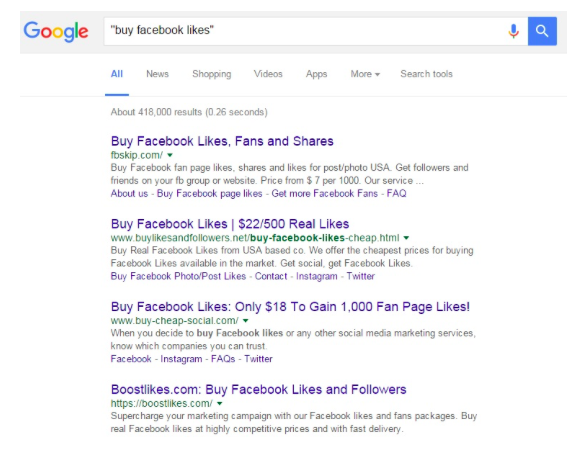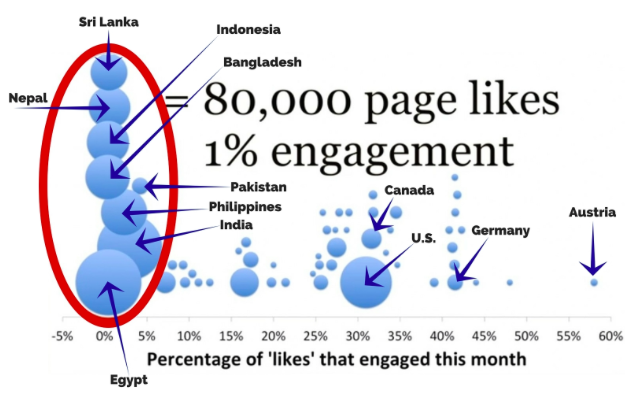Lots of people praise the creativity, lower costs and overall efficiency of advertising on social media. And, with over 1.5 billion users, Facebook’s ad reach can’t be ignored. But, there’s a darker side to Facebook advertising involving click farms and ad fraud that a lot of people don’t know about. According to the study done by eZanga, 37% marketers have absolutely no idea about the origin of Ad frauds.
What Are Click Farms?
Click farms are usually started in developing countries where workers are paid to click on and like Facebook pages and posts from fake profiles. They’re easy to find, too. Just a simple Google search of “buy Facebook likes” returns several purchasing options within the first page.
The novelty of buying Facebook likes started when social media personalities realized that to get endorsement deals, they needed more followers. Social influence was directly correlated with the number of followers you had, so the desire rose too quickly and artificially bump up that number, therefore creating the demand for click farms.
More Likes Aren’t Always Better
Facebook’s algorithm defines engagement as “the percentage of people who saw a post that reacted to, shared, clicked, or commented on it.”
People can buy likes from these click farms for their Facebook page or posts. Since Facebook’s current algorithm boosts posts with higher engagement percentages, buying likes for a post can increase its chances of showing up in newsfeeds initially.
Ultimately though, buying page or post likes can decrease the page’s organic reach over time since those bought likes won’t keep engaging with your posts. If you have thousands of fake followers, but they aren’t clicking on or sharing your content, your organic posts will rarely show to your genuine followers who would engage with it.
While the engagement algorithm is an annoyance for the average Facebook user who may not see their friends’ posts at all, for brands it’s more than just annoying — it’s making Facebook advertising expensive. Part of that’s thanks to click farms that click to build up influence, but don’t convert, raking up page likes but hurting page engagement.
How Do Click Farms Hurt Facebook Advertisers
Click fraud has already been a problem for a long time in digital advertising, and with click farms clicking on ads but having no further engagement with a page, it’s growing on social media, too.
To avoid detection by Facebook’s fraud algorithm, click farmers will like more than just what they’re paid to like, including paid Facebook advertising, and they’ll do this through numerous profiles.
When click farmers engage with your ad, your page likes may increase, but your percentage of engagement, and therefore your visibility, will decrease. Low visibility means you have to pay for more advertising to promote individual posts and risk becoming the victim of even more fraud.
For example, the U.S. State Department spent $630,000 on Facebook to acquire 2 million fans. But, when their engagement was only at 2%, they realized they had only spent to acquire fake followers.
By that point, the U.S. State Department would have been so restricted by the lack of organic engagement that their posts would have stopped showing to even their real followers.
This means that even if you don’t buy likes, you may still be a victim of click farmers. If you run an advertising campaign and see your page quickly increase in likes, but your engagement rate stays the same or goes down, it’s probably because click farmers engaged with your ad, cost you money, and then didn’t participate in any further engagement.
Another Facebook page, called Veritasium, also decided to pay for advertisements. After the campaign, Veritasium broke down its new followers based on where they’re from and the percentage of page likes from each country who engaged during that month.
Source: Veritasium
In this image, each bubble represents a country, and the size of the bubble corresponds to the number of likes received from each country. All of the bubbles with 5-60% of followers who engage are from western countries.
But, a majority of the bubbles on the left are users from developing countries, such as Egypt and Bangladesh, where less than 1% of the people who liked the page engaged during the month.
Veritasium never paid for likes; the page used legitimate Facebook advertising. But even though their number of followers increased to over 70,000 in just a few months, the engagement rate decreased. This means that Veritasium paid for advertising that actually hurt their page.
Click farmers took advantage of the advertisements to help cover their tracks, and because the engagement rate decreased, Veritasium’s organic posts are now less likely to show up to their genuine followers.
Since there’s currently no way to delete fake likes in bulk, brands and businesses on Facebook then have to pay to promote individual posts to reach the users who have already liked their page.
So What Can You Do?
You should monitor your new likes and Facebook followers. Real followers behave much differently than fake followers. Real followers will like, comment, and share posts with friends, therefore boosting your visibility. Fake likes don’t actually boost the viewability of your page because when they like your page or a post, it only boosts it to their fake followers who won’t engage either.
There are many companies out there who specialize in click fraud and filter traffic to ensure that only genuinely interested consumers will see your ad across the internet. But this is where social media is still lacking. Even though Facebook is monitoring for fraudulent activity, with all the click farms out there, it’s hard to keep up with all the false likes.
Not all paid social is jaded. There are still a ton of perks to social media advertising. But, like any other form of digital advertising, you need to review your conversions over viewability. Views mean nothing if they don’t convert to anything.



